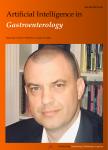Biophysics inspired artificial intelligence for colorectal cancer characterization
作者机构:UCD Centre for Precision SurgeryDublin 7 D07 Y9AWIreland IBM ResearchIBM Research IrelandDublin 15 D15 HN66Ireland Department of SurgeryUniversity Hospital WaterfordUniversity College CorkWaterford X91 ER8EIreland Department of SurgeryMater Misericordiae University Hospital(MMUH)Dublin 7Ireland
出 版 物:《Artificial Intelligence in Gastroenterology》 (胃肠病学中的人工智能(英文))
年 卷 期:2021年第2卷第3期
页 面:77-84页
学科分类:1002[医学-临床医学] 100214[医学-肿瘤学] 10[医学]
主 题:Gastroenterology Artificial intelligence Gastrointestinal surgery Deep learning Biophysics Machine learning
摘 要:Over the last ten years artificial intelligence(AI)methods have begun to pervade even the most common everyday tasks such as email filtering and mobile *** the necessary quality and safety standards may have understandably slowed the introduction of AI to healthcare when compared with other industries,we are now beginning to see AI methods becoming more available to the clinician in select *** this paper we discuss current AI methods as they pertain to gastrointestinal procedures including both gastroenterology and gastrointestinal *** current state of the art for polyp detection in gastroenterology is explored with a particular focus on deep leaning,its strengths,as well as some of the factors that may limit its application to the field of *** use of biophysics(utilizing physics to study and explain biological phenomena)in combination with more traditional machine learning is also discussed and proposed as an alternative approach that may solve some of the challenges associated with deep *** and present uses of biophysics inspired AI methods,such as the use of fluorescence guided surgery to aid in the characterization of colorectal lesions,are used to illustrate the role biophysicsinspired AI can play in the exciting future of the gastrointestinal proceduralist.




